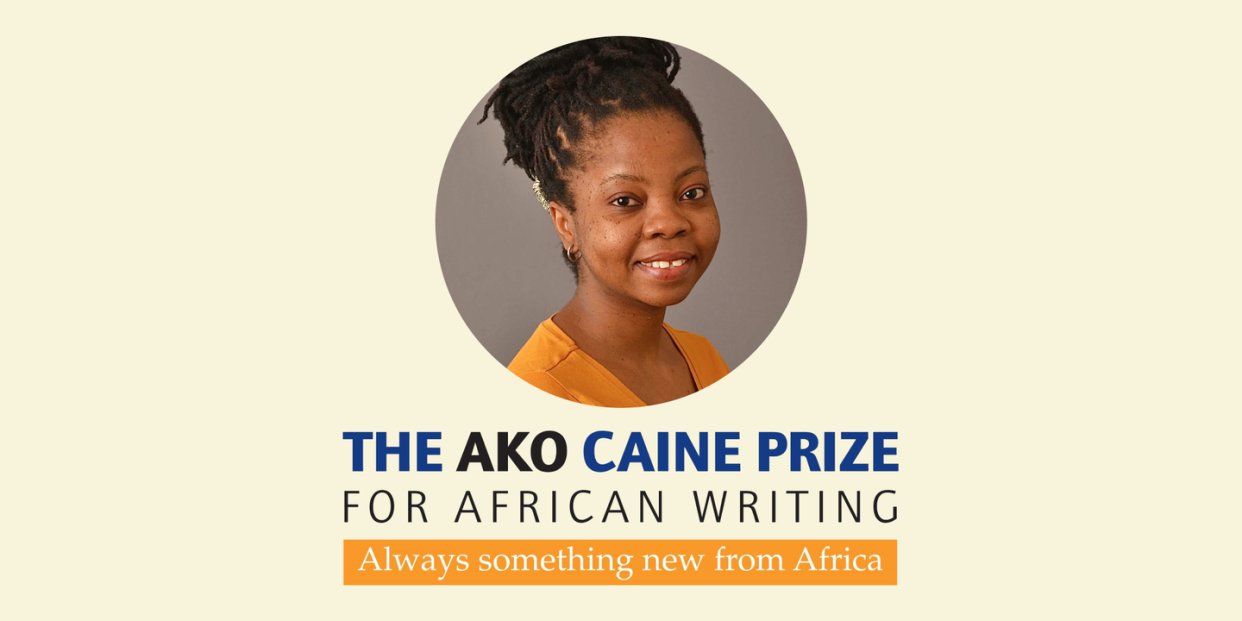Idza Luhumyo Is the 2022 Caine Prize for African Writing Winner

Kenyan author Idza Luhumyo was announced as the 2022 winner of the Caine Prize today at the Victoria and Albert Museum in London. She won for her story “Five Years Next Sunday,” which was also the winner of the 2019/20 Short Story Day Africa Prize and was published in The Johannesburg Review of Books.
The AKO Caine Prize for African Writing was established in 2000 in memory of Sir Michael Harris Caine, the former chairman of Booker Group who cofounded the Man Booker Prize. The Caine Prize is awarded yearly to a short story by a writer from Africa or the African diaspora. The 2022 judges were Nigerian author and award-winning journalist Okey Ndibe, who served as chair; French Guinean author Elisa Diallo; South African podcast host Letlhogonolo Mokgoroane; London-based Nigerian visual artist Àsìkò Okelarin; and Kenyan Book Bunk cofounder Angela Wachuka.
This year’s five shortlisted authors were selected out of 349 entries from 27 African countries. Ndibe says this year’s entries “represented a staggering feast. It was enchantment galore, a testament to the vibrancy, variety, and splendor of creative talent among writers of African descent.… It’s a credit to the judges’ dedication that we have a shortlist that runs the gamut stylistically and thematically.”
The other shortlisted authors were: Joshua Chizoma (Nigeria) for “Collector of Memories,” Nana-Ama Danquah (Ghana) for “When a Man Loves a Woman,” Hannah Giorgis (Ethiopia) for “A Double-Edged Inheritance,” and Billie McTernan (Ghana) for “The Labadi Sunshine Bar.” Their stories are available to read here.
Oprah Daily spoke with with winner and a shortlisted author about the nomination and their future plans. Luhumyo’s stories have been published in Jalada Africa, the 2016 Writivism Anthology: Sundown and Other Stories, and Gordon Square Review. She was the inaugural winner of the 2020 Margaret Busby New Daughters of Africa Award. In her Caine Prize winning story, a young woman has been growing her locs for nearly five years, and has become known as a “woman caller”—one who calls the rain. A chance encounter changes her family’s fortunes, and for the first time, she feels seen and loved. Luhumyo’s story is slow and quiet, guiding the reader to an inevitable but surprising ending.
Hannah Giorgis is a staff writer at The Atlantic, and her work has been published in The New York Times Magazine and The Guardian. “A Double-Edged Inheritance” was published in Addis Ababa Noir (2020). Giorgis’s sentences are exacting, with not a word out of place, in a story about the cold and calculated ways powerful families maintain their status by destroying obstacles and inconveniences. It’s also a tale of three women—intelligent and resilient—who refused to be stereotyped.
Oprah Daily: You are a staff writer at The Atlantic and write nonfiction. When and why did you decide to venture into fiction?
Giorgis: As far back as I can remember, I’ve always loved reading fiction. I would hide in my cousins’ bedrooms when I was a child to read. But I didn’t think of myself as someone who could seriously write fiction until Maaza Mengiste, an incredible author, reached out to me for a short story for the Addis Ababa Noir anthology. At first I was really hesitant because I knew it would require a different approach to my creative process, but it turned out I really enjoyed pushing myself.
What did you want to convey in that story?
Giorgis: I think a lot about the afterlives of certain types of violence, dislocation, and displacement, about the ways that geopolitical conflicts play out in everyday interactions, how they shape our relationships to ourselves and our families. I was thinking of what we expect of women culturally, and ask them to do. And there had to be a specter of violence or haunting—because it’s noir.
Luhumyo: I am from the coast of Kenya, where when old women or men start to have gray hair, they are said to be witches and sent to certain villages where they are kind of banished. There are many reasons why people do this; sometimes just because they want land and the old people are not dying fast enough. I was thinking of that and the connection with hair.
What does this nomination mean to you?
Giorgis: I’m just so thrilled to be in the company of an incredible cohort of writers whose work challenges me. I’m incredibly grateful for that and to Maaza for encouraging me in the first place and for remaining a staunch and compassionate advocate.
Luhumyo: The Caine Prize is well-known on the African continent. Being nominated is very validating and a bit scary, but it’s a pretty huge deal for me.
What are your plans for the future?
Giorgis: In terms of fiction, I’m not entirely sure. Could be another story or a novel or something in the narrative visual space. I’ll keep you posted!
Luhumyo: I’m totally focused on the new novel I’m writing. And I love being back into it!
You Might Also Like

